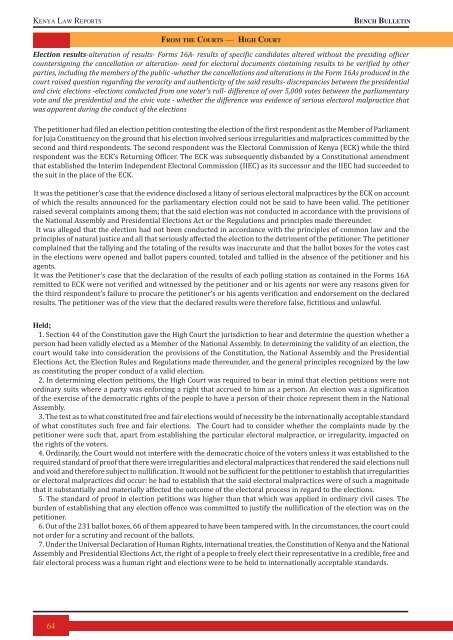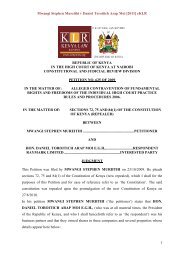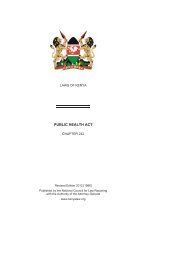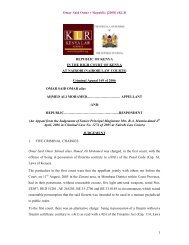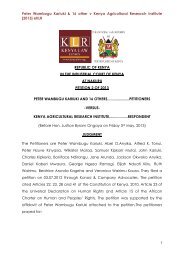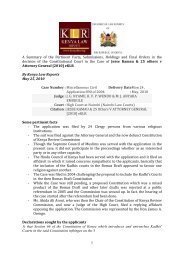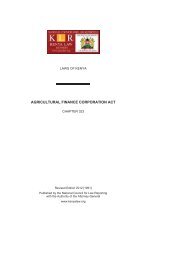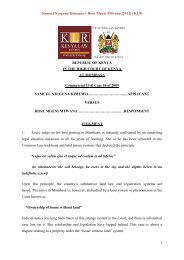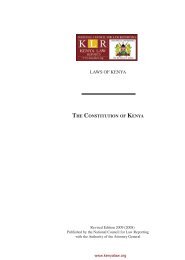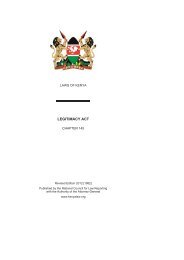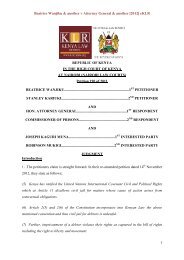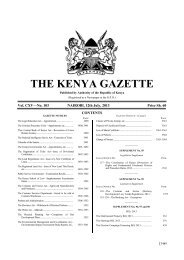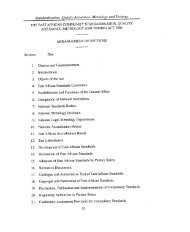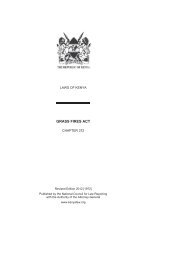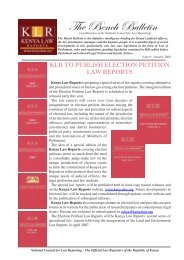Bench Bulletin - Issue 12 - Kenya Law Reports
Bench Bulletin - Issue 12 - Kenya Law Reports
Bench Bulletin - Issue 12 - Kenya Law Reports
You also want an ePaper? Increase the reach of your titles
YUMPU automatically turns print PDFs into web optimized ePapers that Google loves.
KENYA LAW REPORTS<br />
BENCH BULLETIN<br />
FROM THE COURTS — HIGH COURT<br />
Election results-alteration of results- Forms 16A- results of specific candidates altered without the presiding officer<br />
countersigning the cancellation or alteration- need for electoral documents containing results to be verified by other<br />
parties, including the members of the public -whether the cancellations and alterations in the Form 16As produced in the<br />
court raised question regarding the veracity and authenticity of the said results- discrepancies between the presidential<br />
and civic elections -elections conducted from one voter’s roll- difference of over 5,000 votes between the parliamentary<br />
vote and the presidential and the civic vote - whether the difference was evidence of serious electoral malpractice that<br />
was apparent during the conduct of the elections<br />
The petitioner had filed an election petition contesting the election of the first respondent as the Member of Parliament<br />
for Juja Constituency on the ground that his election involved serious irregularities and malpractices committed by the<br />
second and third respondents. The second respondent was the Electoral Commission of <strong>Kenya</strong> (ECK) while the third<br />
respondent was the ECK’s Returning Officer. The ECK was subsequently disbanded by a Constitutional amendment<br />
that established the Interim Independent Electoral Commission (IIEC) as its successor and the IIEC had succeeded to<br />
the suit in the place of the ECK.<br />
It was the petitioner’s case that the evidence disclosed a litany of serious electoral malpractices by the ECK on account<br />
of which the results announced for the parliamentary election could not be said to have been valid. The petitioner<br />
raised several complaints among them; that the said election was not conducted in accordance with the provisions of<br />
the National Assembly and Presidential Elections Act or the Regulations and principles made thereunder.<br />
It was alleged that the election had not been conducted in accordance with the principles of common law and the<br />
principles of natural justice and all that seriously affected the election to the detriment of the petitioner. The petitioner<br />
complained that the tallying and the totaling of the results was inaccurate and that the ballot boxes for the votes cast<br />
in the elections were opened and ballot papers counted, totaled and tallied in the absence of the petitioner and his<br />
agents.<br />
It was the Petitioner’s case that the declaration of the results of each polling station as contained in the Forms 16A<br />
remitted to ECK were not verified and witnessed by the petitioner and or his agents nor were any reasons given for<br />
the third respondent’s failure to procure the petitioner’s or his agents verification and endorsement on the declared<br />
results. The petitioner was of the view that the declared results were therefore false, fictitious and unlawful.<br />
Held;<br />
1. Section 44 of the Constitution gave the High Court the jurisdiction to hear and determine the question whether a<br />
person had been validly elected as a Member of the National Assembly. In determining the validity of an election, the<br />
court would take into consideration the provisions of the Constitution, the National Assembly and the Presidential<br />
Elections Act, the Election Rules and Regulations made thereunder, and the general principles recognized by the law<br />
as constituting the proper conduct of a valid election.<br />
2. In determining election petitions, the High Court was required to bear in mind that election petitions were not<br />
ordinary suits where a party was enforcing a right that accrued to him as a person. An election was a signification<br />
of the exercise of the democratic rights of the people to have a person of their choice represent them in the National<br />
Assembly.<br />
3. The test as to what constituted free and fair elections would of necessity be the internationally acceptable standard<br />
of what constitutes such free and fair elections. The Court had to consider whether the complaints made by the<br />
petitioner were such that, apart from establishing the particular electoral malpractice, or irregularity, impacted on<br />
the rights of the voters.<br />
4. Ordinarily, the Court would not interfere with the democratic choice of the voters unless it was established to the<br />
required standard of proof that there were irregularities and electoral malpractices that rendered the said elections null<br />
and void and therefore subject to nullification. It would not be sufficient for the petitioner to establish that irregularities<br />
or electoral malpractices did occur: he had to establish that the said electoral malpractices were of such a magnitude<br />
that it substantially and materially affected the outcome of the electoral process in regard to the elections.<br />
5. The standard of proof in election petitions was higher than that which was applied in ordinary civil cases. The<br />
burden of establishing that any election offence was committed to justify the nullification of the election was on the<br />
petitioner.<br />
6. Out of the 231 ballot boxes, 66 of them appeared to have been tampered with. In the circumstances, the court could<br />
not order for a scrutiny and recount of the ballots.<br />
7. Under the Universal Declaration of Human Rights, international treaties, the Constitution of <strong>Kenya</strong> and the National<br />
Assembly and Presidential Elections Act, the right of a people to freely elect their representative in a credible, free and<br />
fair electoral process was a human right and elections were to be held to internationally acceptable standards.<br />
64


